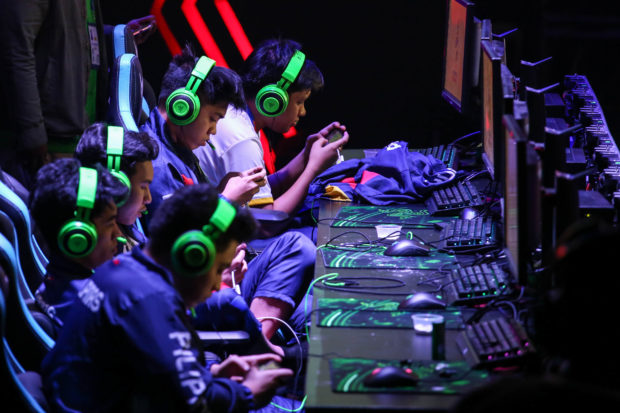
FILE – Team Philippines competes in the eSports event of the 2019 Southeast Asian Games in Filoil Flying V Arena in San Juan. INQUIRER PHOTO/ JAM STA ROSA
Competition is heating up and the medal rounds are looming. It’s the Southeast Asian Games and gladiators of a different make have been battling it out at Filoil Flying V Centre, hoping to make themselves count for their country in the medal tally.
Esports is here, and by the looks of it, it’s here to stay.
The discipline has overcome debates on its status as a sport, with the wide livestream of games and television features helping boost the narrative that competition among its practitioners is as hyper-intense as that of conventional athletic contests.
“There’s more and more and more people telling it’s a sport than saying it’s not,” said Ren Vitug, one of the pioneers of the sports scene in the Philippines.
The SEA Games federation certainly agrees.
Six gold medals will be disputed across the events, namely DOTA 2, Mobile Legends: Bang Bang, Starcraft 2, Hearthstone, Arena of Valor, and Tekken 7. Nine out of the 11 Asean countries are joining the hunt for gold medals.
The Philippines is represented by Team Sibol, which is made up of 27 gamers who have made their mark in the international arena.
And the team is putting itself solidly in the battle for golds.
Sibol’s Mobile Legends: Bang Bang crew pulled out all the necessary stops to turn back Vietnam, 2-0, and secure a podium finish in the lower bracket semifinal. Karl Nepumuceno was aggressive right from the opening bell, helping the Filipinos fend off a feisty fightback from the visitors in Game 2.
“We’re happy that we’ve secured a medal, but we’re going to prove that we’re capable of getting that gold,” the 15-year-old gamer said.
JR Castromayor, who provided Sibol a much-needed boost, declared: “We’re going to win it all.”
Caviar Acampado also delivered a gritty performance to be assured of a silver in Starcraft II. He, too, is not settling for that.
“I’m glad that I’m sure that I’m sure I’ll finish second, but I’m not contented,” said the athlete, who goes by the gaming tag “EnDerr.”
Acampano’s motivation is clear. He could be the first to deliver a gold for the Philippines in the landmark event.
“Kahit papaano, may na-ambag na ko, (At least, I’ve already made a contribution),” he said.
More than he knows.
As the biennial event plods on, it is clear esports is firmly entrenched in its environment.
The venue alone reeks of big-time competition. Assorted lights, a smoke machine, massive screens that show just how huge the online following of the event is.
“We’re not even counting the people streaming on other sites,” a journalist mumbled. “It’s crazy.”
And it isn’t going anywhere.
For Benjamin Assarasakorn of Thailand E-Sports Federation, the landmark hosting should pave the way for other SEA nations to treat the discipline with the same fanfare.
“This [will] leave a legacy for the SEA countries,” he said. “It’s our job to live up to the expectations that the Philippines has set.”
“This is the first time governments came together, came in and invested on teams,” added Kelvin Tan, secretary general of Singapore Esports Association.
“It’s only just going get bigger now,” Vitug said.